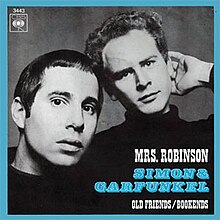Mrs. Robinson
| "Mrs. Robinson" | ||||||||
|---|---|---|---|---|---|---|---|---|
 |
||||||||
| Single by Simon & Garfunkel | ||||||||
| from the album Bookends | ||||||||
| B-side | "Old Friends/Bookends" | |||||||
| Released | April 5, 1968 | |||||||
| Format | 7" single | |||||||
| Recorded | February 2, 1968 Columbia Studio A (New York City) |
|||||||
| Genre | ||||||||
| Length | 4:02 | |||||||
| Label | Columbia | |||||||
| Writer(s) | ||||||||
| Producer(s) |
|
|||||||
| Simon & Garfunkel singles chronology | ||||||||
|
||||||||
|
||||||||
"Mrs. Robinson" is a song by American music duo Simon & Garfunkel from their fourth studio album, Bookends (1968). Produced by the duo and Roy Halee, it is famous for its inclusion in the 1967 film The Graduate. The song was written by Paul Simon, who pitched it to director Mike Nichols alongside Art Garfunkel after Nichols rejected two other songs intended for the film. The song contains a famous reference to baseball star Joe DiMaggio.
"Mrs. Robinson" became the duo's second chart-topper, hitting number one on the Billboard Hot 100, and peaking within the top 10 of multiple other countries, including the United Kingdom, Ireland, and Spain, among others. In 1969, it became the first rock song to win the Grammy Award for Record of the Year. The song has been covered by a number of artists, including Frank Sinatra, the Lemonheads, and Bon Jovi. In 2004, it finished at #6 on AFI's 100 Years...100 Songs survey of top tunes in American cinema.
Simon & Garfunkel reached national fame in the United States in 1965–66, touring colleges and releasing a string of hit singles and albums. Meanwhile, director Mike Nichols, then filming The Graduate, became fascinated with the duo's past two efforts, listening to them nonstop before and after filming. After two weeks of this obsession, he met with Columbia Records chairman Clive Davis to ask for permission to license Simon & Garfunkel music for his film. Davis viewed it as a perfect fit and envisioned a best-selling soundtrack album.Paul Simon was not as immediately receptive, viewing movies as akin to "selling out", but he agreed to write at least one or two new songs for the film after being impressed by Nichols' wit and the script.Leonard Hirshan, a powerful agent at William Morris, negotiated a deal that paid Simon $25,000 to submit three songs to Nichols and producer Lawrence Turman.
...
Wikipedia
